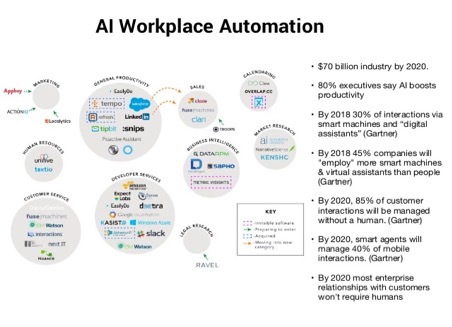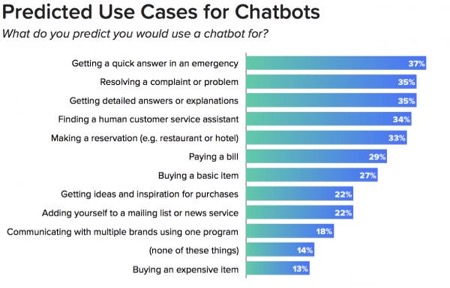How Artificial Intelligence and Machine Learning Has Simplified E-commerce

The world of e-commerce is changing. With the advent of new technologies, it’s becoming easier for customers to find and buy the things that truly interest them.
These same technologies make it easier for electronic retailers to sell their products.
Specifically, the growth of artificial intelligence and machine learning are going a long way toward making everyone’s lives easier. Indeed, a Gartner report predicts that more than 80 percent of customers interactions will be handled by AI by 2020.

These advances coincide with a period of rapid growth in e-commerce.
According to Statista, e-commerce sales around the world reached $2.29 trillion in 2017 and are expected to grow to $2.774 trillion by the end of 2018 – a leap of 20 percent year to year.
Mobile e-commerce is showing even greater signs of growth. It’s predicted that mobile will make up approximately 70 percent of all e-commerce traffic by the end of 2018.
Many of these advancements come from the progress made in Artificial Intelligence and Machine Learning.
Artificial Intelligence, or AI, is used to describe machines that complete specific tasks by mimicking human intelligence.
Machine learning is a specialized aspect of AI, wherein the machine’s performance improves with experience over a length of time. E-commerce already is and set to gain considerably from AI & ML.
1. Personalized Recommendations and Targeted Ads
These technologies can be used in a variety of ways to improve the lives of both customers and retailers.
For one, personalized recommendations or targeted ads couldn’t function without machine learning, and they’re becoming more effective over time as a result of the algorithms.
This is good news for the 73 percent of customers who revealed in a study by Janrain that they were sick of seeing irrelevant content.
Machine learning can be used to improve e-commerce search results each time a person visits a website as it learns the customer’s personal preferences and purchase history. This method is more advanced than simple keyword matching, given that these tools can provide search rankings based on what the user will find most relevant.
2. Voice Commands
In 2017, more than 60 percent of users used voice commands to make online searches. As software and devices like Siri, Alexis, and Google Home become more prevalent it’s only expected that this number will rise.
Indeed, depending on who you ask, voice searches could make up as much as half of all searches by 2020. What’s clear is that it’s an important consideration and the technology will likely be receiving an increasingly large influx of investment dollars in the near future.
Many e-commerce stores now have voice search capabilities to help users find products. This is especially useful on mobile. EasyAsk is one app that is built around voice search capabilities, while Chloe AI is a Magento-based voice tool.
3. Search Ranking
Not only is “HOW” we search going to change, but how we see the results will be entirely different as well.
eBay has more than 800 million products listed on its site. It can make it difficult to stand out with numbers like those. But machine learning can help with features like search ranking by using the customer’s profile (age, previous product views, phrasing habits, and more) and presenting them to the user in a way that’s most relevant to them.
Basically, it’s less about displaying everything that matches a specific keyword search and more about predicting what customers may actually want to see.
A simple version of this is query expansion is when completed search terms are automatically offered up with the most popular options.

4. Virtual Assistants
If you’ve been perusing the web in recent years, you may have noticed an uptick in the presence of online or virtual assistants. These are small chatbots that can respond to simple queries and requests.
It’s a technology that is only going to become more advanced with time too. Google believed in it enough to invest approximately US$501 million in acquiring DeepMind, an artificial intelligence company.
More recently, Google invested an undisclosed amount into Japanese startup – and AI and machine learning specialist – ABEJA.
While the headlines have largely shown Google using this new technology to make scientific inquiries and play chess, there are undoubtedly myriad ways this technology will be used to improve our lives. That includes things like virtual assistants.
According to a Ubisend report, 1 out of 5 consumers is currently willing to buy products from a chatbot. 40 percent of consumers also use chatbots to look for offers and deals. These are numbers that can only go up as the tech improves.
Indeed, a similar 2017 Hubspot report shows that 48 percent of customers would rather connect with a company via live chat than through any other means of contact.
There are a number of tasks e-commerce retailers can offload to virtual assistants. Let’s take a look at a few:
Customer Service
Keeping customers happy is the first sign of a good business. But for those running their own business, it can be a time-consuming prospect. Virtual assistants can be trained to answer customer questions over the phone, live chat, email, or social media.

It allows for the real-time response to customers, which is integral when a conversion is on the line. These assistants can deal with irate customers, lost shipments, and much more.
They can also guide customers through the sales process. In essence, holding their hand from the initial landing page until they click the “PAY” button.
It’s also a chance to upsell or cross-sell other products that the customer may be interested in.
Dealing With Orders
Virtual assistants can help process the orders, including entry, shipment, and invoicing. They can handle the delivery of customer invoices to drop-ship vendors, for instance.
They can also handle returns and exchanges, checking in with customers and suppliers directly through email to manage returns, exchanges, and refunds.
Handling Inventory
Inventory management is generally tedious for e-commerce entities. A virtual assistant with good machine learning capabilities could also update your website to reflect the stock that your suppliers have on hand and let the retailer know when they need to re-order specific items.
Of course, these are just a handful of the potentially limitless possibilities that AI and Machine learning offer to virtual assistants. But one thing that is for sure is that these machines will only improve with time.
5. Adaption and Adoption
Machine learning and artificial intelligence are staged to become some of the most important tools in the dropseller’s toolbox.
Imagine, being able to change prices to compete with your competitor’s, to keep up with demand, or even shift dependent on the time of day or type of customer.
Or what if we wanted to look ahead and determine what products we should be ordering. Machines can process data and find insights that may otherwise escape people.
These tools can be applied to any number of business intelligence or analytical queries. This deeper understanding will result from more accurate information and the ability to process it at record speeds allowing companies to make decisions that are backed up by data, helping them offer better products and services.
Artificial intelligence certainly won’t solve every problem that an e-commerce retailer will face, but it also can’t be avoided.
Whether the technology is fully embraced in the years to come remains to be seen, but it’s clear that the industry will be changed. For the moment, it all looks promising.
Have a question or comment?
We’d love to hear your thoughts on this article. You can find us on Twitter!
